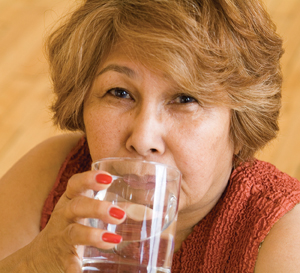Preventing Kidney Stones
Preventing Kidney Stones
If you’ve had a kidney stone, you may worry that you’ll have another. Removing or passing your stone doesn’t prevent future stones. But with your healthcare provider’s help, you can reduce your risk of forming new stones. Follow up with your healthcare provider to help find new stones. You may need follow-up every 3 months to a year for a lifetime.
Drink lots of water
Staying well-hydrated is the best way to reduce your risk of future stones. Drink 8 12-ounce glasses of water daily. Have 2 with each meal and 2 between meals. Try keeping a pitcher of water nearby during the day and at night.
Take medicines if needed
Medicines, including vitamins and minerals, may be prescribed for certain types of stones. You may want to write your doses and medicine times on a calendar. Some medicines decrease stone-forming chemicals in your blood. Others help prevent those chemicals from crystallizing in urine. Still others help keep a normal acid balance in your urine.
Follow your prescribed diet
Your healthcare provider will tell you which foods contain the chemicals you should avoid. Your healthcare provider may also suggest talking to a dietitian. He or she can help you plan meals you’ll enjoy. These meals won’t put you at risk for future stones. You may be told to limit certain foods, depending on which type of stones you’ve had. You should limit the amount of salt in your food to about 2 grams a day. This will help prevent most types of kidney stones. Make sure you get an adequate amount of calcium in your diet.
For calcium oxalate stones: Limit animal protein, such as meat, eggs, and fish. Limit grapefruit juice and alcohol. Limit high-oxalate foods (such as cola, tea, chocolate, spinach, rhubarb, wheat bran, and peanuts).
For uric acid stones: Limit high-purine foods, such as mushrooms, peas, beans, anchovies, meat, poultry, shellfish, and organ meats. These foods increase uric acid production.
For cystine stones: Limit high-methionine foods (fish is the most common, but eggs and meats, also). These foods increase production of cystine.
Updated:
September 17, 2017
Sources:
Prevention of Recurrent Calcium Stones in Adults. UpToDate.
Reviewed By:
Latif, Walead, DO,Walton-Ziegler, Olivia, MS, PA-C
